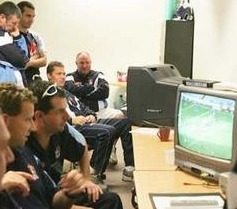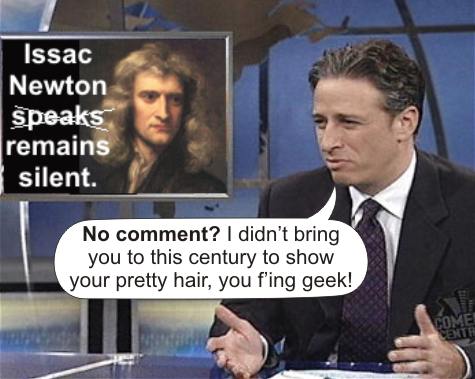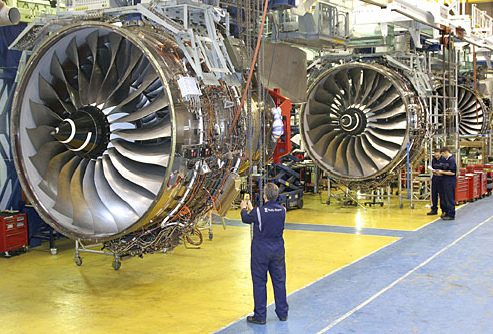The ENIAC computer was used to solve math problems. By altering the
switches and cables on the computer, they could change the sequence of
pulses that were sent into the computer, and how those pulses flowed through
the vacuum tubes. Every time they wanted to solve a different math problem,
somebody had to figure out how to set the switches and wires so that the
computer would solve the new problem.
It was not easy to figure out how to set the switches and wires to solve
a math problem, but once everything was set and the electricity was turned
on, the computer could solve complicated math problems much faster than
somebody with a paper and pencil.
Today a tiny integrated circuit has more computing power than the gigantic
ENIAC. The integrated circuit works on the exact same principles, but it
replaces vacuum tubes, switches, and cables with microscopic components.
The most important change that has been made since the ENIAC is that
people no longer have to manually set switches or cables. Modern computers
are designed so that the switches are set by software.
Since a computer only understands on and off, software provides a sequence
of on and off signals to the computer. If you were to write software on
paper and represent the on and off signals with ones and zeros, all software
would look like a meaningless sequence of ones and zeros:
1010101000010101011110001001010100010
Those ones and zeros are processed in groups, such as 16 or 32 at
a time. When you start a software program, the computer reads the first
group of ones and zeros, and that turns a group of transistors on or off,
which causes electricity to flow or not flow through various wires in the
integrated circuit. Then the computer will read another group of ones and
zeros, and that gives the transistors a different sequence of on and off
settings, changing the flow of electricity through the circuits.

If you find it hard to believe that meaningless pulses of electricity
can do something intelligent, just think of how this concept could be applied
to an Abacus. In this photograph, the Abacus has 12 columns and 7 rows
of slidable rings with 2 empty rows. You could solve complicated math problems
without knowing what you are doing if somebody provided you with a set
of instructions on how to move the rings. The instruction sheet could be
visual, and it could use a zero to represent a ring and a dash to represent
an empty space, such as this:
Step 1: Reset the abacus
--- ------ ---
000 000000 000
000 000000 000
--- ------ ---
000 000000 000
000 000000 000
000 000000 000
000 000000 000
000 000000 000
Step two: shift these three gaps
--- ------ --0
000 000000 00-
000 000000 000
--- ---0-0 ---
000 000000 000
000 00000- 000
000 000-00 000
000 000000 000
000 000000 000
In this example, each step would be a group of zeros and
dashes. You would "process" all of the zeros and dashes in one step
before you moved to the next step. Then you would process the zeros and
dashes in the next step, and so on. At the end of all the instructions,
you would have the answer to a math problem. You could refer to this list
as Abacus software. You could refer
to each step as an instruction.
This type of software would be similar to what the ENIAC computer was
programed with. It would be very inflexible. You have to write new software
for every math problem.
A computer operates on a similar principle. It reads a group of ones
and zeros, but instead of sliding the rings of an Abacus, it sets transistors
to either on or off. Each of these groups of ones and zeros is referred
to as an instruction. To make a computer
more versatile, it does not necessarily read the instructions in sequential
order. Depending on the results of one particular instruction, it may jump
to another part of the software and start reading instructions from that
location.
As you can imagine, It would be extremely irritating to write computer
software using ones and zeros. To make software development more practical,
different people created different computer languages that more closely
resemble human languages. Each of these computer languages had a small
number of "words" that represented a sequence of ones and zeros.
A person selects one of the computer languages and then develops a computer
program using the words in that particular language. When he is finished,
his words are translated into ones and zeros. A computer program does the
translation since no human would want to do it. This type of computer program
could be referred to as a translator,
but somebody decided to refer to it as a compiler
instead.
You could write Abacus software using words, also. In example above,
a person could write the word Reset
for Step 1 instead of all of those zeros and dashes, and later that word
would be translated into that group of zeros and dashes.
Computer programs are best understood when you think of them as lists
of instructions. They are similar to the list a mother might
leave her child, if her child was incredibly stupid:
1. Sit in a chair at the kitchen table.
2. Look at the clock on the wall.
3. If it is less than 3:00 PM, go to instruction #2
4. Walk over to the refrigerator.
5. Open refrigerator by pulling handle of door.
While you and I would consider such a list to be detailed to an absurd
extent, that list doesn't have anywhere near enough detail to control a
robot. Once you realize that a computer is as stupid as an Abacus, you
will have a better understanding of how difficult it is to develop robots
that talk and walk.
Calculators and Computers

When you buy a calculator, you simply turn it on and it is
immediately ready and able to perform math. You don't have to buy any software
for it. Calculators come off the assembly line knowing everything they
need to know. A calculator will not even accept software. Calculators are
inflexible.
By comparison, a computer is incapable of doing anything when it comes
off the assembly line. Somebody has to install software in the computer
before it can do something. This ability to accept software makes a computer
extremely versatile.
The hardware of a computer and a pocket calculator are identical. If
you open up both types of products, and examine their electronic circuits,
you would find the exact same transistors, resistors, capacitors, and other
components. You would discover that both the calculator and a computer
perform arithmetic in the exact same manner. Both devices understand only
that electricity is either flowing, or it isn't; a circuit is either
on,
or it is off.
One difference between a calculator and a computer is that a computer
has a lot more components. The extra components provide the computer with
a very large memory, whereas an inexpensive calculator has only enough
memory to keep track of one number.
Both a computer and a calculator process instructions. However, the
list of instructions that a calculator follows are built
into its circuitry by the manufacturer, and the calculator is
not designed to accept any other instructions. The factory does the equivalent
of setting the switches and wires of the ENIAC computer. This makes the
calculator "born" knowing exactly what to do and how to do it.
A computer is also "born" with instructions, but computers are provided
only the most basic instructions, such as how to perform math, how to use
a keyboard, and how to transfer data from a disk drive. In a sense, a computer
is given only the instructions necessary to keep its heart beating. These
instructions are often described as the firmware
of a computer. In order for a computer to be useful, we have to provide
it with additional lists of instructions, which today are usually sold
on CD-ROM.
By designing a computer to accept instructions, a computer is extremely
flexible. If a computer is provided with advanced software, it will be
able to do a tremendous amount of work. However, if the person who designed
the software is not very good at it, the software will perform so badly
that you are better off not using it at all. Or if the software was designed
by a malicious programmer, then running the software could erase your files
or scramble your data. The software is the most important aspect of
a computer.
Understanding computers will help
you understand calculators
If an electrical engineer was taught only
how to design and program computers,
he would be able to easily and quickly learn how to design a calculator.
By comparison, if an engineer was taught only how to design a simple
calculator, he would have to learn a lot more to be able to design and
program computers.
This concept also applies to aircraft, also. If an aircraft engineer
is taught how to design a large, commercial aircraft, and he will be able
to easily and quickly learn how to design a single-engine private plane.
However, if he is only taught is how to make a single-engine private plane,
then he will have a lot to learn in order to design a large, commercial
aircraft.
It takes a lot more time and effort to understand computers and commercial
aircraft than it does to learn about calculators and single-engine planes.
However, once somebody learns the more complex version of a product, he
will be able to easily understand the simpler version of that product.
If this concept applies to living creatures, then we could easily understand
animals if we can figure out the more complex humans, but understanding
an animal will give us only a partial understanding of ourselves.
Biologists are telling us the exact opposite;
namely, that we can understand humans by studying animals, but we cannot
understand animals by looking at humans.
Advanced animals require "culture"
A caterpillar knows how to take care of itself as soon as it
comes out of its egg. A caterpillar raised in isolation behaves the same
as caterpillars raised with other caterpillars. The obvious conclusion
is that caterpillars don't learn anything from other caterpillars. They
are the equivalent of calculators that are programmed at the factory.
By comparison, a monkey raised in isolation will not behave the same
as other monkeys. The obvious conclusion is that young monkeys pick up
an intangible substance from other monkeys. Once you accept the fact that
a monkey is a stupid human, you will understand that the baby monkeys are
picking up that mysterious substance we refer to as "information", "knowledge",
"education", "culture", or "skills". A monkey does not acquire very much
culture, but monkeys do have culture.
If a baby human were raised in isolation, it would not pick up a language,
arithmetic, science, engineering, music, carpentry, or plumbing. It would
appear to be just an intelligent monkey. Without culture, a human would
operate only on the instructions that were programmed into our brain by
our DNA. These instructions are analogous to the firmware of a computer.
They give us our animal-like qualities, such as causing us to put things
in our mouth when we are hungry, and spit them out if they taste bad. Without
culture, a human behaves according to his firmware, and that will cause
him to closely resemble a monkey.
The brains of humans and monkeys are very similar. Both of us must acquire
information during our childhood in order to fit in with our societies.
However, the monkey does not have a large memory, so it cannot hold very
much culture.
Our ancestors in 20,000 BC did not have very much culture. They lived
and behaved in a manner very similar to monkeys. The most significant difference
between people then and people today is that people today have a lot more
information inside their memories. This allows us to do activities that
were impossible centuries ago, such as driving automobiles, operating computers,
and discussing whether we should bomb Iran's nuclear facilities.
Human software programs
The concept that humans need information in their minds is
nothing new, so what is the value of this robot perspective? Only that
it does a better job of explaining what that "information" is: it is the
biological
equivalent of computer software; it is instructions that we follow
in order to accomplish some task.
Government systems, holiday celebrations, monetary systems, and other
aspects of human "culture" are the human version of computer software;
they are packages of instructions that humans follow in order to accomplish
some task. However, you do not refer to them as "instructions"; instead
you refer to them as customs, traditions, laws, morals, rules, ethics,
standards, beliefs, and regulations. Nor do you think of them as "packages"
or "sets". And you do not consider yourself to follow them in order to
"accomplish some task"; instead, you assume you follow them in order to
avoid jail or criticism, or to be polite and helpful, or to have fun, or
because your ancestors have done so for an eternity.

Perhaps the simplest example of a human following a set of
instructions is a woman following a recipe in a cookbook. In her memory
are stored hundreds of recipes, and she has thousands more written in books.
Books are an external storage device; the human equivalent of CD ROMs.
When a woman wants to make a meal she searches through the recipes in
her mind, and perhaps through those in her external storage, until she
finds one that appeals to her and that she has the ingredients for. Then
she loads the instructions into the processing center of her mind and executes
them. And why does she follow those instructions? Simply to "accomplish
a task".

When people make pottery they are also following a list of
instructions in order to accomplish a task. The list began to develop sometime
around 7000 BC when people discovered that roasting certain types of mud
create a hard and durable material. This instruction package tells us what
types of material to use to make the clay; how much water to add; how to
shape it into useful forms; how to bake it; and thousands of other details.
The original package of instructions and 7000 B.C. was very simple and
crude, but today it is extremely detailed.
Likewise, when people make iron or grow cotton they are following sets
of instructions, some of which began development in prehistoric times.
All of these "cultural activities" could be described as "human software"
because they are sets of instructions.
It is fairly easy to realize that a woman who is baking a cake is following
a set of instructions because cake is tangible and the instructions are
clearly written down on paper. We can watch her read an instruction, execute
it, read the next instruction, and so on. We can easily understand that
she is manipulating raw materials through a set of previously developed
procedures.
However, is not so easy to realize that governments, holidays, or schools
are also sets of instructions because those things are much more complex.
And it is not as easy to realize that the paper the Constitution is written
on is just the human version of a floppy disk, and that the words in the
Constitution are a set of instructions that provide organization to a group
of humans, just as MS-DOS and other operating systems provides organization
to the components of a computer.
Money is another example of a set of instructions that is difficult
to recognize as instructions. Money seems to be a very real substance,
but only coins, checks, and credit cards are tangible. Money itself is
just a set of instructions somewhere inside our mind. Those instructions
dictate how the coins and other objects are to be used. If it were possible
to erase only that set of instructions from your memory, you would continue
to be the same person and live the exact same life, but money would have
no meaning to you.

A construction crew is another example of a human software
package. If you have ever watched a construction crew put up a building
you may have been amazed at how well they coordinate their efforts. The
men appear to be doing whatever they please, but as a building slowly rises
from the ground we realize that they are somehow coordinated in a manner
that no animals are capable of.
Ants and bees may appear to be similar to human construction crews,
but they are very different. Only humans can vary the type of structures
they create, deal with unexpected problems, and buy and sell the structures.
Ants and bees can build only one type of structure, and if anything unexpected
happens they will not be able to deal with it. How do humans achieve such
behavior? What exactly is a construction crew, and how does it function
as a unit?
Most people assume a construction crew is a group of men following orders
from a "boss," but that is not a complete answer. For example, why do the
men follow the boss? How does the boss know what to do?
A construction crew is just a package of software. In each man's mind
is a set of instructions that tell them they are in a hierarchy and that
each man has a specific role in the hierarchy. They listen to their boss
because they were instructed to do so. They work on certain days and for
certain hours because they were instructed to do so.
The structure they create is another set of instructions; a set developed
by architects and engineers. This set is too complex to keep in our memory
or describe in words, so it is written on paper as "contracts" and "blueprints"
to make sure everyone clearly understands them.

An
assembly line is also
a package of human software. The men are tangible, and so are their tools,
but the "assembly line" is just some instructions inside their mind. If
we could go into their minds and erase those particular instructions, the
men would become individuals who have no idea that they are supposed to
be working together. And if we could erase the part of their memory that
tells them how to use their tools, they wouldn't know what their tools
were. Compare that to ants and bees who are born knowing how to construct
a home for themselves, and who do not have a memory to erase.
One final example of a set of instructions that you may not recognize
as such is the driving of cars. Nobody could even open a car door if his
memory was blank. Driving a car requires following a lot of instructions.
We must learn where in the car to sit; what to do with the keys; what the
various dials and knobs do; where on the street to drive; what to do when
we see certain types of colored lights; and what to do when we hear a siren.
We use those instructions to guide our behavior as we drive. As we see
various lights, road signs, other cars, and pedestrians, our mind scans
its memory for the appropriate instruction, and then we follow that instruction.
Of course, unlike a computer, we have emotions that try to influence our
decisions, so sometimes we don't follow the instructions exactly.
Social Systems
When humans engage in what we call "cultural activities," what
we are doing is following the human equivalent of computer programs. Our
DNA built into our brain only a few simple activities, such as crawling,
pouting, walking, and eating, but by creating and following man-made packages
of instructions we can do much more. We could refer to these instructions
as human software, social technology, or social systems.
Just as we do with computer programs, we could give our social systems
a name, copyright them, and sell them to other nations. For example, the
system that we use to regulate automobile traffic, (ie, drivers licenses,
street signs, traffic rules) could be given a silly name, such as "Traffic
Master" and we could boast to other nations that they will reduce their
traffic problems and accidents if they install our system into the minds
of their citizens.
Furthermore, although it would have no value other than to emphasize
the similarities between human minds and computers, we could write our
transportation system exactly like a computer program, and we could even
teach it to children in this form:
1 REM ******* TRAFFIC MASTER ********
3 REM * © 1985 by the USA
5 REM *
7 REM * PROGRAM 1. How To Drive A Car
9 REM *******************************
10 open left car door
20 if locked, go to line 500
30 sit in seat
40 find ignition key
50 if not found, go to line 1200
60 insert key in ignition
As we improve the traffic system, we could sell updates to other nations.
As with software, we could call the updates TRAFFIC MASTER version 2, TRAFFIC
MASTER version 3, etc.
It may seem silly to sell something like a traffic system, but social
technology takes a lot of time and effort to develop, and a lot of mistakes
are made in the process. Therefore, a nation will benefit greatly by buying
an advanced system, thereby bypassing the process of developing it themselves.
At the moment it would be difficult for a nation to sell social technology
because only a few people are aware of this concept. The people who develop
our transportation system, for example, don't understand what they're doing.
In fact, America does not even have "a transportation system". Rather,
different states within America have slightly different instructions regulating
traffic and drivers licenses. The people creating our traffic system don't
fully understand what they're doing (or they don't care), so they don't
coordinate with one another.
Your software is what makes you
appear better from an ape
Every time you use money, celebrate a holiday, conduct a scientific
experiment, and make a sandwich you are behaving like a robot that is following
a list of instructions that it picked up from other robots. Human culture
is whatever those instructions are. A human nation is a collection of biological
robots united together and supervised by all the intangible social systems
we carry around inside our heads.
If it were possible to erase the memory of every human on the planet,
all advanced activities would immediately cease. Every human would appear
to be nothing more than an intelligent ape. All of us would become speechless
creatures capable only of simple emotional noises, and we would have no
idea what any of the material goods in our environment are.
A lot of people assume that the difference between an ape and a human
is that we have some special qualities, such as souls, or intelligence.
However, the most significant difference between us is that our minds are
capable of holding an enormous amount of that intangible substance we refer
to as "culture". Apes also have culture, but their culture is much simpler
because their mind is not capable of memorizing or following complex lists
of instructions.
Hardware vs. Software Improvements
There are two distinct ways to improve computers: we can improve
the hardware, or we can improve the software. We want progress in both
areas, of course, but we want most of our effort to go into software development.
Software is by far the most significant aspect of a computer; it virtually
determines what a computer can do.
As strange as it may seem, we would not benefit much if a Martian were
to give us some incredibly advanced computer hardware if the only software
we could run on it is the crude word processors and spreadsheets we find
in retail stores today. The advanced Martian hardware would never be able
to reach the potential it is capable of.
However, if a Martian were to write some advanced software for our primitive
computers, the computers we have right now would be able to do a lot more.
The computer hardware we have right now is capable of doing much more than
it currently does.
It takes a long time to develop computer software, so it's going to
take a long time before we reach the limit for the computer hardware we
have today. However, by the time we reach that limit, computer hardware
will be more advanced. The end result is that software is always lagging
behind the computer hardware.
This concept applies to construction crews, also. The tools they have
right now are capable of building much nicer cities, but they don't have
the blueprints; they don't have the set of instructions
on what to do with those tools. If a Martian were to provide a construction
crew with some very advanced blueprints, we could have some amazing cities.
Have we Reached the Limit of Human
Potential?
These same concepts apply to human minds. There are two methods
to improve the human world: we can improve our hardware (i.e., breed more
"intelligent" people), or we can improve our software.
Unlike computers, improving biological hardware is extremely time consuming
because biological hardware improves only through random changes in chromosomes.
If engineers had to develop improvements to computers by making random
changes to their blueprints, it would take thousands of years to bring
minor improvements to a computer.
The easiest and quickest way to improve the human world is to improve
the software that is running inside everybody's mind. At the other extreme,
the way to ruin the human world is to raise children on self-destructive
culture.
If you have trouble understanding these concepts, imagine if a Martian
spacecraft were to crash on the earth, and all of the Martians die except
for one young baby. That Martian baby would have to grow up among humans.
It would initially pick up the same disorganized hodgepodge of primitive
culture that fills human minds today. When the Martian became a teenager,
it would start to think for itself, and it would wonder if men and women
truly are a unisex creature; whether Apollo astronauts really did land
on the moon; whether 6 million Jews really did die in the Nazi death camps;
and whether Al Qaeda terrorists really were responsible for the the September
11 attack. The Martian would waste
a lot of its adult life trying to correct the idiotic beliefs and propaganda
that it picked up from us during its childhood. Superior people need superior
software in order to realize the potential their minds are capable of.
Software is by far the most significant aspect of a human. The information
in our minds virtually determines what our world is like. The primary difference
between people today and our ancestors is that we have better
information in our minds.
What are the chances that we today have reached the limits of the human
hardware? Certainly our hardware is capable of more than what we use it
for today. Certainly we can advance beyond this primitive existence.
Patriots or Fools?
It is a well known fact that computer software can and should
be improved. This is why computer companies around the world are frantically
competing with each other to produce the most advanced software. They employ
thousands of people and spend millions of dollars a year on the research
and development of software.
Only a fool would resist this software development and insist we cling
to our original software from 1950. Only a fool would claim that computers
are at their limit of productivity and that we should stop trying to improve
them. We all want progress in computer software.
However, the opposite is true with human software. No nation
is employing anybody or spending any money to research or develop human
culture. No frantic race is occurring between nations to develop the most
advanced government system, school system, or city. No person anywhere
waits impatiently for advances in his culture. Quite the contrary! Most
people insist it is "patriotic" to cling onto the culture a nation was
founded with.
We would consider the British to be fools if they considered it patriotic
to use the original computer software first developed in the 1950's; why
are they not fools for considering it patriotic to follow a government
system and other social systems that date from the Middle
Ages? You would consider your fellow Americans to be fools if
they insisted it is patriotic to use the transportation devices of the
1700s; why are they not fools for insisting it is patriotic to use only
the social systems that date from that era?
Culture is "human software", and as soon as people understand this,
an entirely new future opens up for mankind: specifically, we could research
and develop culture. We could compete with each other to invent the best
improvements to the social systems we live by. Who knows what the human
world would be like after a few centuries of serious attempts to improve
our culture. Or is such a thing impossible? Am I the fool to suggest it?
People have been modifying culture
for selfish reasons
Religious, government, and business leaders have been trying
to modify culture for thousands of years, although they never completely
understood what they were doing. They thought of themselves as "making
money", or "manipulating the stupid people", but what they were actually
doing was
modifying human software.
For example, the editor of a newspaper is supposedly the first person to
promote Mother-in-Law's Day,
perhaps in the hope of titillating the public to either increase the
circulation of his newspaper, or improve his image.
The greeting card companies created cards for Mother-In-Law's Day,
and pushed this new cultural activity on the public, in order to increase their profits.
That mysterious substance we call "culture" can indeed be studied and
developed, and it can even be bought and sold. Unfortunately, as of today,
the only people who are trying to modify our culture are doing so for selfish
reasons, not to help the human race.
We can improve our culture as soon
as we realize it is possible to do so
At the moment, everybody considers their particular culture
to be the best. As a result, when somebody suggests improving their culture,
people consider the idea crazy, unpatriotic, or traitorous. We must consider
all of our social systems to be like text editing software; specifically,
that it needs to be improved.
A lot of Americans are aware that the country is having problems, but
the typical solution is to boast that the Constitution is the greatest
document ever written, and suggest that we can fix our problems by going
back to what the Constitution originally was. Supposedly, the laws that
have been added during the past two centuries have been ruining the Constitution.
Proposing that we return to a government system that was created 200
years ago is as ridiculous as somebody proposing that we return to the
original software of the 1950s. These proposals show that people have the
wrong attitude towards social technology. We will not improve our governments,
schools, or cities by going back in time to the more primitive versions.
In order to make our government better, we have to study the issue of government
and learn from our mistakes. We must develop something better.
It's impossible to develop the ultimate
government system
A common and destructive attitude is that somebody is capable
of creating the ultimate government or other social technology. For example,
the idea that 55 Americans in 1789 could have created the ultimate government
system is absurd. There is always a
gradual change from one thing to another; everything is a spectrum from
one extreme to another. There are no dividing lines between anything, not
even between male and female.
What this means is that it is impossible for the American constitution
to be the ultimate government system. Instead, it is simply a part of the
spectrum in the development of government systems; it is merely a change
from some previous government system.
If we considered an automobile, railroad, or computer to be the ultimate,
we wouldn't make any attempt to improve upon it. Likewise, when we consider
a government or other social system to be the ultimate, we won't bother
trying to improve upon it.
The best we can do is make improvements
It is impossible for a scientist to make a sudden leap in knowledge.
The best a scientist can do is to make improvements to the knowledge that
he learned from other people.
No society suddenly advanced from walking on two legs to riding in horse
drawn chariots. No society suddenly leaped from riding in horse drawn chariots
to flying in airplanes. Transportation technology improved very slowly.
Each scientist and engineer could only add to the work of previous people.
The only way a society can make sudden leaps in physical technology is
when they learn the technology from a more advanced society.
The same is true of social technology. No society suddenly leaped from
bartering to using an advanced banking system. No society suddenly jumped
from illiteracy to an advanced school system. Nor did any society leap
into advanced city planning, legal systems, or patent offices. All social
technology developed and improved slowly. The only way a society can make
sudden leaps in social development is if a more advanced society teaches
them.
The decimal system was a recent
invention
An example of how each person can only add a little bit to
what has already been created is the decimal system.
Thousands of years ago people developed numbers, (ie, 1,2,3, and 4), and
some unknown time later people developed the concept of fractions. However,
prior to the 1600s, nobody would have understood a price tag of $19.50
because the concept of a decimal point had not been created yet. Throughout
most of human existence the only known way to represent parts of numbers
was with fractions, often fractions of 60 or 360. People preferred fractions
of 60 because 60 is a number that is easily divided into halves, thirds,
fourths, fifths, sixths, and several other units.
It was not until the past few centuries that mankind advanced beyond
fractions. One person who played a role in this advancement was Simon Stevin.
In 1585 he wrote a small booklet advocating the representation of fractions
as units of tenths, hundredths, and other multiples of ten. He did not
conceive the idea of a decimal point; rather, he just wanted all fractions
to
be based on units of ten rather than units of 60 or some other unit.
However, he did not propose writing the fractions in the typical manner
such as 1/10 to 3/100. Instead, since all of the units were multiples of
10, he suggesting writing only the numerator and a number to represent
which multiple of 10 it referred to. For example, he would represent 25.306
as 250 31 63, and a price of $32.95
would be $320 91 52.
As you can guess, not many people were interested in his "improvement"
over fractions. However, his concept of discarding the denominator of the
fraction and representing the fraction as multiples of 10 caused some people
to think about the issue, and somebody soon conceived of the idea of putting
a decimal point between the integer portion and the fractional portion,
and of using a zero to represent nothing.
The concept of decimal points spread rapidly around the world. Actually,
in some nations, such as Germany, they don't use a decimal point; rather,
they use a comma, and they use a decimal point where we use a comma. For
example, 12,345.67 in America would be 12.345,67 in Germany.
The development of the decimal system is an example of how nothing
develops suddenly. Changes are gradual; the best anybody can
do is improve upon the work of other people. A review of the American government
system should help explain how it was actually just a variation of other
primitive governments of that era, and that we are fools
to continue following it.
America's government was a modification
of previous governments
America became an independent nation in an era when slavery
was still active in many nations, and Plato was still the undisputed authority
of governments. The Americans believed that they were forming the greatest
society possible, but that was impossible.
All of the governments created as of 1776 had been very crude. There
was no way the Americans could have leaped from those primitive governments
into the ultimate government system. Rather, the best the Americans could
achieve was a somewhat less crummy government system; a slight improvement
over the existing governments. The history of America shows that this is
exactly what happened.
America declared its independence in 1776, and there were battles between
the British and the Americans over the next five years. As with all primitive
people, it never occurred to the Americans to design a government system
before
they became independent. Primitive people never prepare for the future;
rather, like a child running away from home, they just do it. The leaders
of the revolt did not begin to design a new government until the war of
independence was in progress.
The British had provided each of the 13 colonies with a simple government,
but the nation of America had no leadership. Each state actually became
an independent nation in 1776. Each state took control of its colonial
government and modified it slightly to suit their tastes, such as prohibiting
the government from torturing prisoners and from interfering with religion.
Each state acted on its own as if it was an independent nation. When the
states wanted to deal with a national issue, such as creating a national
government, they had to call a meeting and send representatives to it,
just as primitive tribes held meetings.
By 1777 a group of state representatives had designed what they thought
was a national government for America. They called it the Articles of
Confederation. They submitted this system to the states for approval.
Years later, in 1781, the last state agreed to follow this system and it
finally went into effect. By this time America desperately needed a national
government. The only thing that was keeping the 13 states united was the
war with England, but the war was ending this year. Also, many states were
having serious economic problems.
The Articles of Confederation was supposed to unite the thirteen groups
of people into a single nation and create a national government to take
care of their problems, but it quickly proved to be a failure. For one
thing, the Articles did not unite the states at all. The ignorant people
who created the Articles wrote that: "Each state retains its sovereignty,
freedom, and independence". America was hardly a united nation when each
state was sovereign, free, and independent! Some high school students today
are capable of creating a more sensible government.
The national government created by the Articles was composed of a group
of delegates selected each year by the states. That type of government
is like the United Nations organization; i.e., it is just a meeting place
for different societies to discuss their problems. The Articles of Confederation
did not, and could not, give such a government any authority to do anything.
Each state was free to create their own money, to raise and equip their
own military force, and to ignore the national government. The states were
so independent that they could - and some actually did - create trade barriers
against each other, just like selfish nations having temper tantrums. The
national government was not allowed to tax the citizens so it was supposed
to get its operating money from the states, but the states did not have
to give any money if they did not want to.
The Articles of Confederation was actually just a declaration of friendship
between the different states; it was not a national government. In fact,
the Articles even declared this to be the case: "The said states hereby
severally enter into a firm league of friendship with each other". The
Articles just set up a vague alliance between thirteen different nations.
Like all people, the founders of America thought of themselves as highly
educated people who knew all about life. They assumed they were living
in an advanced, "modern" era. The same problem occurs with people today;
we think of ourselves as wealthy, educated, and "modern". We don't realize
that our material goods and lifestyle will be condemned as crude, violent,
and miserable to people in the distant future.
There are no lawyers today who understand
the purpose of a law, and in 1776 the ignorance about laws was even more
extreme. They also had less of an understanding of language. As a result,
it is extremely difficult to make sense of the Articles of Confederation.
For example:
"The united states in congress assembled shall also have the
sole and exclusive right and power of regulating the alloy and value of
coin struck by their own authority, or by that of the respected states...."
That sentence seems to give the national
government the authority to create coins and regulate their value, as well
as regulate the value of the coins produced by each state.
But in a long, one sentence paragraph listing off the things the national
government cannot do:
"The united states in congress assembled shall never...coin
money, nor regulate the value thereof...."
So, could the government create or regulate money? The Articles of Confederation
was worthless. Even with that "government"
the nation was not a united nation but thirteen independent societies,
between which there was considerable distrust and quarreling. And each
year their problems grew worse. By 1783 there were over a dozen different
currencies in use in America because each state was free to create its
own money. Since they could create as much money as they desired, most
of it was becoming worthless.
By 1786 the economy of the states was suffering. Unemployment was becoming
a serious problem, and is not easy to create unemployment when most of
the population is self-employed farmers. In other words, the American government
was beyond merely lousy; it was terrible.
There was not much cooperation between the states. International trade
was difficult because each state was behaving like an independent nation.
The infant American society was facing its first major catastrophe. Some
English citizens were snickering, and some Americans were embarrassed.
Americans criticize communist nations for ignoring embarrassing aspects
of their history, but Americans do the exact same thing when they discuss
American history between 1776 and 1789. America's first government was
a disaster, and America almost self-destructed
during this period.
A meeting of the states was held in 1786 to discuss America's problems.
As happened at so many other meetings, only a
few representatives showed up. Americans love to boast about
their "founding fathers", but the evidence suggests that they were not
as responsible, intelligent, or educated as we like to believe they were.
The few representatives who showed up at the 1786 meeting decided to
cancel the meeting and try holding another meeting the next year; in May
of 1787. They were planning to make some improvements to the Articles of
Confederation. Supposedly Version 2.0 of the Articles of Confederation
was going to be the bug-free government the nation needed.
America's problems grew worse during the following months. Some citizens
even staged a rebellion against their state government. Some Americans
were wondering if breaking away from England was a good idea. America's
problems were becoming so severe that twelve out of the thirteen states
decided to send representatives to the May 1787 meeting. However, they
were not so concerned about America that the representatives were punctual.
Instead, most representatives arrived weeks late, and some never showed
up. The meeting was delayed almost two weeks while they waited for about
half of the representatives to arrive. Eventually 55 representatives showed
up.
At the meeting the representatives decided that the Articles of Confederation
was hopeless and should be discarded. They decided to design a completely
new government system. This time they decided to put more thought and effort
into it. They decided to study the subject of governments before creating
a new one. This was one of mankind's first attempts to design a government
through research and development.
Unfortunately, there was not much knowledge about governments for them
to study. The ancient Greeks and Romans were the best
source of knowledge about governments in 1789! As a result, they looked
through some of the remarks about government from the ancient Greeks and
Romans, and they looked at the governments of Europe. They tried to learn
a little bit about governments before creating a new one.
When they were finished developing the Constitution, they were proud
to announce that it was based on ancient writings, but that is actually
something to be embarrassed about. It is a sign that Europeans had
not
learned anything about governments during all the centuries
following the Greek and Roman societies.
Culture is not wine; it doesn't
improve with age
Imagine a carpenter building a house for you and proudly announcing
that the house is based on prehistoric Greek technology. Or how about a
dentist proudly announcing that he just fixed your teeth based on ancient
Roman technology? What would you think if Microsoft announced some new
scientific software that was based on the switches and cabling diagrams
of the ENIAC computer of the 1940s?
The attitude towards culture is that it cannot
be improved. Therefore, if a government system is based on something
from ancient Greece, it must be wonderful.
The creators of the Constitution
were fearful of governments
Government had a bad reputation in the 18th century, but most
people realized that they had to have one for some mysterious reason. And
by 1787 America's leaders realized that it had to have more authority than
the Articles of Confederation. However, they did not understand why they
needed a government. As a result, they designed their Constitution from
the point of view that government was a necessary evil; a monster that
must be kept under control. They did not
design the Constitution from the point of view of how to best manage and
unify the American society.
The writers of the Constitution wanted the government to be made up
of representatives of the citizens because they assumed that a government
of representatives would serve the public rather than behave in whatever
selfish manner they pleased. They wanted their government to be a "public
servant," not a leader or a supervisor. So, just like the Articles of Confederation,
the Constitution set up a government of representatives.
To prevent the government from getting too much control over the citizens,
the authority in the government was deliberately divided up among all representatives
in such a manner that no government official had much authority to do anything.
Selfishness interfered with the
development of the Constitution
Creating the Constitution was difficult because each of the
13 states thought of themselves as an independent nation, and they selfishly
wanted the Constitution designed to suit their state. For example, the
small states wanted all the states to have equal representation in government,
but the large states wanted representation to be based on the population
of the state.
The representatives could not ignore state boundaries and consider themselves
as citizens of a single nation. They could not design a government from
the point of view of what is best for the American people. Rather, they
behaved as if they were members of ignorant tribes who were forming a possibly
dangerous alliance.
The problem of representation was resolved by creating a government
that was a variation of the English government. Specifically, the government
was split into halves. In one half, the House of Representatives, each
state was represented according to their population, and in the other half,
the Senate, each state had equal representation.
The problem of how to count the population caused more idiotic arguments.
The population had to be counted accurately because each state was going
to get representation in government according to their population. However,
there were a lot of slaves in America, most of which were in the South.
About one third of the Southern population was slaves. Should slaves be
counted as "people", or should slaves be considered "property"?
If slaves are people, then the southern states would get more representation
in government than they would otherwise get. The southern states said that
slaves were people; the northern states
complained that slaves should be considered property.
To further complicate this issue, each state was supposed to give tax
money to the national government according to their population. If slaves
are people, then the southern states would have to give more money to the
federal government. The southern states said slaves were not
people for tax purposes, but the northern states said that is the only
time the slaves were people! The "founding fathers" were behaving
like obnoxious, selfish brats who were twisting the rules of the game to
suit their selfish desires.
The issue of slavery was finally resolved when they agreed to consider
a slave to be equal to 3/5ths of a person for both taxation and representation.
Eventually the representatives resolved all of their arguments and the
Constitution was completed. They decided that the new government will go
into effect if nine of the thirteen states approve it.
About a year later nine states had approved it, and so it went into
effect. George Washington became the first president. However, one of the
first problems the President had to deal with was to convince the remaining
states to agree to follow the Constitution. Two of the remaining states
were complaining that they wanted a "Bill Of Rights" to prevent the national
government from abusing the citizens.
The Bill Of Rights was added afterwards
Many Americans hold up the "Bill of Rights" as the greatest
part of the Constitution, but it was not part of the Constitution. The
writers of the Constitution had decided not to include a bill of rights
for various reasons. After the Constitution went into effect, a couple
of the states refused to follow it until a Bill of Rights was added. Eventually
the government officials gave in and a bill of rights was written and added
to the Constitution as amendments.
By 1790 all the states agreed to the Constitution and the Bill of Rights,
and so we could say that 1790 was the beginning of the America as we know
it today. Americans declared their independence in 1776 but it took them
about 14 years of fumbling around before they had implemented a government
that was capable of managing their society.
I mentioned before that the best a society can do is bring slight improvements
to existing technology. Looking at the Constitution shows how true that
is. It ended up being just a modification of England's government, which
in turn developed during the last centuries of the Middle Ages as the people
tried to acquire some control over the kings. Let's review this.
The Development of the representative
government
During the Middle Ages, the King (or Queen) was the dictatorial
ruler of his region. The people in his kingdom would sometimes ask him
for certain policies or favors. Because it was difficult to travel in that
era, people began selecting somebody to serve as a representative, and
the representative would make the trip to the King.
The concept of sending representatives to the King spread throughout
Europe. Eventually this concept evolved into a job in which a person goes
back and forth between the King and the people he represents. This in turn
evolved into a government that consists of representatives who try to influence
the leader.
After people began settling into large cities, they started segregating
into two main groups. The smaller group consisted of people in leadership
positions and business, and the larger group was everybody else, most of
whom were farmers. This division between people caused the representatives
to separate into two primary groups; one group represented the wealthy,
and the other group represented the common people.
The men who designed the Constitution took this concept of two groups
of representatives, and they decided that one group will represent the
people (the Representatives), and the other group will represent the states
(the Senators).
However, the resulting government doesn't actually make sense because
the ordinary voter selects both senators and representatives. Therefore,
both
groups are representing the voters;
neither of them represents the "states".
How can a government be designed so that a "state" is represented? A
state is an intangible concept; an arbitrary boundary. States are not creatures
with desires.
You might think that the state government could select the Senators,
but this would not provide representation for the "state", either. Rather,
in this case the Senators would represent the state government officials,
who in turn were selected by the voters, which means that the voters were
still in control of the Senate, but indirectly. There is no
sensible way to give representation to an intangible concept.
The concept of representing a state is especially ridiculous in our
era because people and businesses often move from one state to another.
What exactly is being represented when we represent a "state"?
No matter how you look at it, the concept of representing a "state"
is stupid. The concept of states is
also self-destructive because it encourages the people within a state to
think of themselves as better than the people in other states. It doesn't
help to unify the nation; rather, it helps to break it down.
America's Civil War
By 1860 most nations had prohibited slavery. The northern states
of America also wanted to stop it but the southern states wanted to keep
slavery active. In 1860, some of the people in the southern states decided
to leave America.
The Constitution was designed from the point of view that government
is a wild animal that needs to be under control, so the federal government
was not given much authority. Furthermore, the Constitution encouraged
the people to think of themselves as members of their particular state,
not members of America. To make the problem of unification worse, as new
land was added to America, it was added in the form of new states.
The lack of unity and the feeling of independence was so extreme that
the southern states did not even bother to get together and declare their
independence together. Instead, one state simply announced that it was
leaving America, and later another state would decide to leave America.
The states were behaving like primitive people casually walking away from
a campfire to start their own camp. The mayor of New York City even suggested
that his city consider seceding from America and becoming independent!
It is possible that if nothing had been done to stop this, America would
have broken down into thousands of independent nations.
By early 1861 some of the independent southern states decided to form
a new society, which they called the Confederate States of America. As
would be expected, their new nation had no unity either. Their new government
was very similar to the Constitution. Soon other states joined the Confederacy.
The people in control of the northern states did not want the Southern
states to form a new nation, so in April 1861 the Americans began fighting
one another in a violent war that lasted about four years. The population
of America was much smaller in 1861, so if you look at tables of deaths
and injuries from that war, take into account the smaller population. The
violence of the Civil War was on a level similar to World War 2.
Many Americans try to minimize the violence of the Civil War by pointing
out that most of the deaths were due to a lack of medical technology. It
is true that the number of deaths would have been reduced tremendously
with modern technology, but modern technology would also have provided
modern weapons, and that would have compensated for the medical technology.
There is no way to get around the fact that the Civil War was a very violent
war, and that it was a sign that the Constitution was a failure
at unifying the people and dealing with their problems.
Judge something by its results
Americans boast that the Constitution is the greatest document
ever written, but it was just a variation of the primitive English government.
It would be difficult to say that one government was better than the other.
Both Britain and America have crummy governments that are being taken over
by a small number of Zionists, and neither government has the ability to
expose the Apollo moon landing hoax, the HoloHoax, or the 9/11 hoax. Both
governments are like retarded girls who
can easily be raped by anybody who
pleases.
The men who created the Constitution were afraid that a powerful government
would abuse the citizens and start ridiculous wars, so they went to the
other extreme and designed a weak, submissive government. They assumed
that a weak government would leave the people alone so that they could
live in peace. Unfortunately, the government was so weak and submissive
that it could not resolve any of the nation's problems. Rather than be
free of violence, corruption, and war, the American people became victims
of organized crime and corrupt government officials.
Americans like to boast that their 55 "founding fathers" were among
the world's most intelligent, responsible, and educated people, but there's
no evidence to support such a theory. Every group of people exaggerates
their good qualities and criticizes other groups, but we cannot solve problems
when we twist history to titillate ourselves. We must look at ourselves
in the same serious manner that a scientist analyzes a tomato plant.
We need to design a better government
We're not going to fix America's problems by "going back" to
or "restoring" the original Constitution. We need to make something better.
A government system is like a computer program. We don't improve a computer
program by returning to an early, primitive version. Instead, we must put
a lot of time and effort into developing something better.
The Constitution and the Bill of Rights are crude documents that are
difficult to understand. They were designed by people who didn't know anything
about governments, language, or laws. Furthermore, the Constitution was
designed in an era when most of the men were primitive farmers; slavery
was an acceptable practice; and the primary form of communication was the
human mouth. It is absurd to expect those primitive documents to be of
value in our technically advanced era.
The people who wrote the Constitution had the attitude that government
was a necessary evil, but that is a destructive attitude. A government
is just a package of human software. We are certainly intelligent enough
to design a better government, and after we create a better government,
we can continually improve it as we learn more about the subject. All we
have to do is change our attitudes towards "culture" and start treating
it as "human software" or as "social technology".
The problem with social technology is that people have a tendency to
resist it, whereas we enjoy physical technology. Understanding this concept
is important, so let me explain it.
Physical technology is useful to
individuals and groups
Imagine that we knew how to dehydrate people without killing
them, just as yeast can be dehydrated. Imagine somebody volunteers to be
dehydrated and sent to a planet in a nearby solar system. Upon his arrival
- millions of years from now - a computer in his spacecraft would fill
his spacesuit with water to bring him back to life.
If you were in charge of making sure that his spacecraft has all the
necessary supplies for him to survive on that other planet, you would provide
him with a lot of physical technology, such as radiation sensors, shovels,
scissors, knives, nail clippers, solar panels, electric air compressors,
and an electric jeep.
Would you also provide that astronaut with a school system, banking
system, traffic system, legal system, patent system, or government system?
Social technology has no value to
individuals
An astronaut alone on a planet millions of miles away from
us wouldn't have any use for a monetary system, a holiday celebration,
or clothing styles. He would have no reason to have a wedding or a birthday
party. Social technology is only useful when there is a society
of
two or more people.
Physical knowledge allows us to manipulate the items in the universe,
whereas social knowledge allows us how to manipulate people. Physical knowledge
gives us control over the physical universe, whereas social knowledge gives
us control over a group of people.
Therefore, physical knowledge would still be useful if you were alone
on a planet because you would be able to use it to manipulate the world
around you. However, social technology has no value unless there are at
least two people.
When people contemplate social systems, they tend to selfishly ask themselves
how the social systems benefit them as individuals. Unfortunately, social
systems do not directly benefit individuals.
Rather, social systems interfere with
our lives and desires.
Social technology is tools; we are
the workpiece
Physical technology gives each of us control over the universe.
Since the universe never complains, each of us can do whatever we want
with the universe. Each of us is free to shape pieces of wood into furniture,
or manipulate silicon into electronic circuits. We can also bake rocks
in furnaces to extract iron or copper. The universe never complains when
we manipulate it.
Physical technology benefits each of us directly, and it does not control
us or interfere with our lives. However, we don't directly benefit from
social technology; rather, social technology controls
our behavior. Social technology puts the individual citizen
into the role of a piece of wood that is being cut by a knife. Since people
don't like being controlled, we resist social technology. We complain that
we should let the people be free to do as they please.
Social technology and "freedom" interfere with one another. It is idiotic
for people to make vague demands for "freedom". It makes more sense to
discuss:
"What sort of controls should put on ourselves, and in which
areas should we be free to do as we please?"
Social technology is valuable
Because social technology has no value to an individual, many
people believe that human life would be better if we eliminated government,
corporations, legal systems, and all other social technology that influences
our lives. These people advocate letting everybody be free to do as they
please.
Unfortunately, social technology actually has much more importance to
a society than does physical technology. Physical technology only gives
a society the ability to control nature to produce material goods, but
social technology determines everything about the people's lives and their
future. If a society has crude social technology, or if the social technology
is not applied properly, then the people's lives will be miserable regardless
of what level of material wealth the people have.
Government systems, tax systems, and other social technology are like
hammers, shovels, and bulldozers; they are tools that we use on ourselves
in order to make us behave in certain ways. Whether a tool is useful to
us or not depends on how it is made and how it is used. A poorly designed
bulldozer, shovel, or hammer will not do a construction crew any good.
In fact, it is possible to design a bulldozer that is so crummy that a
construction crew would be better off without it.
The same concepts apply to social technology. It is possible to design
a government, school, and other social technology that is so crummy that
we are better off without it. Furthermore, it does not help us to use a
tool in the wrong manner. For example, trying to slice tomatoes with a
hammer is worse than not using the hammer at all. Likewise, we are causing
trouble for ourselves when we use a social system in an appropriate manner,
such as allowing our legal system to be used by businesses to remove competition,
or allowing Zionists to arrest people who investigate the Holocaust.
The importance of social technology might become more apparent if you
imagine yourself and thousands of other people today being sent back in
time to 20,000 BC. If you were not allowed to take any physical technology
with you, then you would have to live exactly like the primitive tribes
around you. However, if you were capable of creating a useful government,
school, and other social technology, you would be able to form a united
society. This would allow you to live a more pleasant life than the tribes
around you, and you would advance at a much more rapid pace. The people
around you would appear to be intelligent monkeys by comparison to you.
Today's primitive tribes are examples
of bad culture
Some human societies are still small and nomadic and living
only slightly above the level of animals. Many people believe that today's
primitive tribes are merely a few thousand years behind the rest of us
in development. Supposedly, if we could go back in time a few thousand
years, we would find our own ancestors living just like the primitive tribes
of today. Supposedly the primitive tribes will advance to the level we
are at if we leave them alone.
The most sensible explanation for why some tribes are still primitive
is that they developed social technology that interfered with their development.
For example, near the Sahara desert are a few scattered nomadic tribes
known as the Wodaabe, all of whom are on the verge of extinction.
These people never developed a written language, and some of their social
technology is almost the exact opposite of ours, such as the role of men
and women. In our society men seek wives; unmarried girls spend their time
preening and waiting for a man; and men compete with one another to be
"successful". By comparison, the Wodaabe women take care for their families
and do most of the work. The men do not seek wives, instead a man's wife
is usually prearranged by his parents, but if he wants a different wife
- or more of them - he must find one himself.

To help the men find wives the Wodaabe invented a social affair
to bring people together from different tribes and give the men a chance
to impress the women. It is an annual event that lasts seven days. The
men prepare for the occasion by putting on makeup, shaving their foreheads,
decorating themselves with jewelry, and dressing up in colorful costumes.
Then the men get together in a circle and dance and make funny faces for
the women.
National Geographic has an article about them, and here
is one of the photos:
nationalgeographic.com/ngm/100best/wallpaper08.html
When a society encourages women to mate with men who make funny faces,
they inadvertently breed themselves into clowns. When a society encourages
women to mate with men who are wealthy regardless of whether they earned
their money in a respectable manner or acquired it through crime or inheritances,
they will inadvertently breed themselves into criminals and parasites.
The culture of a society determines what life is like to the people,
and it determines what their future will be. Until recently, the competition
for food continuously exterminated the tribes with the most detrimental
culture. The primitive tribes that exist in the world today avoided extinction
only because they moved into the areas that nobody else wanted to live
in. If every area of the Earth was equally pleasant, then there would be
no primitive tribes.
Today the primitive tribes provide entertainment for the more advanced
nations, but the only way they will continue to survive is if we create
wild game preserves for them to live in. We would have to treat them like
animals. How would that help them or us? We have to face the fact that
they are the losers in life, and they are going extinct, and there is nothing
anybody can do to stop it.
The way a society select leaders; their attitude on what constitutes
"success"; the role of women and men; their method of educating their children;
their views on status symbols; their attitudes towards death; and all their
other social technology determines what sort of life and future the people
will have. It is very important that our culture be designed properly.
Laws and Customs
Our "culture" consists of instructions to control our behavior.
We could divide these instructions into "laws" and "customs". A "law" is
created by our government and enforced by our police. A "custom" develops
inadvertently, and we feel pressured to follow customs in order to fit
in with other people.
No citizen is allowed to misinterpret or ignore a law, and only a few government
officials are allowed to create or alter them, but customs can be created, altered,
misinterpreted, and ignored by each of us.
A custom is created when somebody behaves in a manner that other people
decide to mimic. You can see this happening right now with children who
watch MTV or Hollywood entertainers. The children often mimic the clothing,
behavior, tattoos, and jewelry of the entertainers.
Some of the entertainers may behave in absurd manners simply in order
to attract attention to themselves, but some of them may be crazy. In either
case, the children who pick up the behavior are fools. They are giving
society customs that don't make any sense and don't help any of us.
Many of the customs we practice today can make you wonder about the
sanity of person who first did it. The man who first challenged another
man to see who could drink the most alcohol may have been suffering from
mental problems. The first woman to wear sexually stimulating clothing
may have been a loser who could not attract a man in any other manner.
The first person to poke a hole in his ear and dangle objects from it may
have also been crazy.
Many of the customs we follow today may have started as the crazy behavior
of a person who was suffering mental problems or who wanted to rebel against
society. If a large number of children pick up the behavior, it becomes
a custom, and other people feel pressured to mimic it.
Because many customs are absurd or dangerous, people get tired of following
them, so after a few years they switch to something different. As a result,
customs are always changing.
Laws, on the other hand, tend to be more sensible than customs because
they are deliberately created by our government. Even though our government
is incompetent and dishonest, they would never create laws that are as
ridiculous as some of the customs people are following.
Culture connoisseurs
People often complain about laws, but they rarely complain
about customs. However, aside from the laws that were created to eliminate
competition or help organized crime gangs, laws are much more rational
than customs. It would make more sense for people to complain about customs.
When the government creates a law, we want the law be sensible and useful.
Some people will examine new laws and try to find flaws so that they can
justify removing it. We behave like connoisseurs of fine culture who refuse
to follow anything but the very best.
However, when we are free to decide for ourselves how to behave, we
often choose a practice that we would consider insane if it were a law.
|













